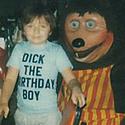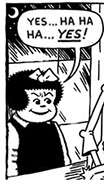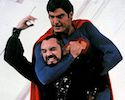|
I mostly enjoyed the movie. Found it gripping, well paced, had good visuals, emotionally affecting, etc. However, I did not like the K is not really Deckard's son reveal and the way it affects the rest of the movie. There's been some discussions about that here already. I'd like to believe that this is something that is supposed to have at least *some* degree of ambiguity. If there isn't any ambiguity at all, and it is 100% what happens, then I don't think it really works for me. It's bad enough that it kind of messes up the movie for me. It kind of breaks the movie for me. The first two hours of the movie do a really solid job at putting you in the main character's shoes, getting you to understand the events from his perspective, etc. You follow along the mystery with him, you start realizing what the answer's going to be along with him, you are following the same steps as the character, everything makes perfect sense. It's a slow process of discovery that really connects you with K. However, when he finds out it isn't true, there's a break. He doesn't discover it through a process, he is just told. By someone we've never seen before, who hasn't been relevant to anything so far, and who is probably the least well-drawn character in the entire movie. It's a big change from how the movie had been delivering information, with very little time left for the movie to be over. From a plot mechanics point of view, it doesn't actually seem to change anything. What happens at the end of the movie is that K rescues Deckard and saves his life. That's pretty much what would have happened had he never found out that he wasn't Deckard's son. When Deckard is captured, the momentum of the movie is towards K rescuing him. There is just this weird, too-brief period where he's told 'actually, you should kill Deckard', one scene (iirc) where he's wandering around and there's *maybe* some doubt. It comes across less as if K underwent some change / evolution (that we the audience get to experience with him), and more as if the movie itself had a momentum towards a certain form of climax that just couldn't be stopped. From a plot/logic point of view, I also don't like it because K being Deckard's son is obvious in a good way. It makes sense within the movie's world but also just looking at it as a movie. It's a movie set 30 years after the original. The main character appears to be around 30, has the same type of job as Deckard, and is a replicant. It makes sense (in a movie sort of way) that this would be the person related to Deckard. The coincidence that he would happen to be the one who finds the bones (and ultimately has to find 'himself') is a bit incredible, but it's the kind of incredible *positive* coincidence that you can buy/accept in a movie. The steps he takes to find out that he's the baby are all perfectly reasonable too. If I remember correctly, he searches for babies born in this date, the abnormality he finds are two babies with the same genes, the 'girl' died but the 'boy' survived and was sent to an orphanage (here I don't entirely remember if K finds out the specific orphanage, or he just infers which one it could be). This leads him to corroboration that the memory is based on a real thing that happened. Then he corroborates that the memory is truly real by talking to the memory-maker, who says 'this memory is real'. The conclusion, then, is that K is the baby, which is a conclusion reached in a pretty reasonable way, which tracks well with this being a movie and a sequel. And, from this conclusion, we have ambiguity but not too many unanswered questions: we can just broadly infer that K would have lost his memory and left the orphanage/sweatshop at some point. There's not too many loose ends to tie here: he's a robot with no family, record, etc. But then its the memorymaker who is the bay. That's not so obvious. It means that, to a large extent, K and his characteristics and the things he goes through are constructed specifically to be a red herring. The obviousness of him being the baby is a *negative* coincidence. This 'negative' coincidence is, imo, less easy to accept in a movie than a positive coincidence, because it's about misleading you. The process by which K comes to believe he's the baby is also misleading. K finds out the memory is real because he goes to the orphanage. He gets there because he finds out the two DNA matches, one girl and one boy. The girl is said to be dead, the boy is said to be alive. He is able to use this information to figure out where the boy could have come from. At this point he already suspects the memory is real, because of the horse. But what if the records said the girl was alive and the boy was dead? Why do they say the girl is dead? It's not 'to throw people off the trail' because K was still able to reach the place where the memory came from.... That whole detail of the two DNAs and one dead/one alive really came across as a kind of nonsensical thing that exists entirely so that K, a man, can continue believing that he's the baby even though the baby was a girl. Then, y'know, basically K has confirmed that the memory is real. It has to be real; he found the horse, where it was supposed to be, from a memory that he shouldn't have. There isn't *really* a need for him to re-confirm that the memory is real, is there? The scene with the memorymaker is kind of misleading too. She basically says "yes, this is real memory. a memory of something that happened". This is a too big of a contrivance imo. It's a contrivance because the movie leads you to believe the only likely options are 'this memory is his' or 'this memory never happened', not 'this memory is someone else's'. K ostensibly has more abilities than the average human and literally works as a detective; you would think that if 'its a real memory, which means whoever put this memory in me is the baby' was a likely option, K would have investigated it. He doesn't, because the plot needs to distract you. Then I guess there's all sorts of questions about what is even going on with the memorymaker. What is her identity? The 'baby girl' with the DNA match was registered as deceased. So what is her citizen number or whatever? She's a civilian who works for a living, who mentions having real parents who set things up for her. How would all this get solved? How much of this is real? I mean obviously all this stuff could have a credible answer within the world of the movie, but it's a ton of missing information. It's too convoluted. You go from a relatively straightforward 'replicants have fake memories; maybe this memory is real b/c this replicant was born' to 'here's a character who makes a living by creating people's memories, who lives in a bubble and thus doesn't really have a lot of experiences to draw memories from, who has fake memories of her real life but who is maybe throwing in real memories into the memories of replicants', I mean c'mon now. I guess the TLDR is that I feel like the twist that K is not Deckard's son doesn't happen organically but instead is something that's just kind of dropped into the movie, makes a lot of the plot less logical and believable, makes a lot of storytelling decisions come across as more contrived, and it makes the plot (in a movie that, although thematically rich and having character development, is almost entirely driven by a straightforward mystery plot) be this kind of pointless thing that didn't amount to anything and was mostly just a bunch of weird coincidences. I really enjoyed the movie except for the twist so I'm more than happy to accept a good defense of it. Pedro De Heredia fucked around with this message at 23:38 on Oct 7, 2017 |
|
|
|

|
| # ? May 14, 2024 03:16 |
|
One of the shots that blew me away was when K is laying down by the fire and the embers rise up into the sky and transforms into the snow as the camera then swoops down past a monochromatic advertisement and the ships roar into view. I literally whispered "loving sick" as that happened in the theater.
|
|
|
|
Bladerunner 2049: I have to torture you offworld I saw it and loved it. I'm annoyed by the final twist but it didn't ruin it for me. But holy poo poo the shots in this movie and the bugged Vegas hologram fight scene.
|
|
|
|
K not being Deckard's son was awesome. I like a good twist, but the thing was that he had been building a new identity based on the idea that he was special, something that Joi was feeding into. But then he finds out that he's not special, and while ruminating on that fact he encounters the giant Joi. The difference between her and his Joi is what makes him understand that it doesn't matter that he's not Deckard's son. He's special because he thought he was. The idea, that stimuli that he formed an emotional response to (in a callback to the original film), has changed him. Just like Joi was changed by him, he was changed by this idea. Also, Joi was definitely a person. This is like... Blade Runner's whole deal.
|
|
|
|
Yeah I really wanted more of JOI's internal point of view - I was really hoping this movie was going to be about that kind of AI instead of replicants and looking into their humanity (movie still owned). Found it interesting that the opening crawl specifically said 'replicants are bioengineered humans used as slaves' - having that as the first line in the movie felt like a hint that this movie was less about whether replicants are human and more about other themes. The previous movie didn't call replicants human in the framing text did it?
|
|
|
|
Serf posted:Also, Joi was definitely a person. This is like... Blade Runner's whole deal. Has there been a lot of sci-fi that eventually goes against this grain? I figure it'd be ripe for subversion, since the audience is generally trained to agree with what you think.
|
|
|
|
n4 posted:
Seriously not enough love or buzz for that scene. I couldn't believe what I was watching. and I'm so glad they kept Deckard's origins a mystery and didn't confirm either way, but also handled it in a "doesn't matter" approach while presenting so many more intriguing questions
|
|
|
|
Pedro De Heredia posted:I mostly enjoyed the movie. Found it gripping, well paced, had good visuals, emotionally affecting, etc. See, it actually worked for me, since the whole time I was thinking "Well wait, if he's Deckard's son, A) that would be one hell of a coincidence, and B) there's a lot of stuff that doesn't add up-after all, if he was born, why does he have a serial number? How did he get hired by the police? Why does he live, work, and identify as a replicant when he would have been born and grown up? There were just too many holes for me to fully buy in to his status as Deckard's son, and as a result the revelation made complete sense to me-especially considering how much it said about K's character, that he must have known the facts of the case didn't line up as neatly as he wanted them to, but he was so desperate to believe it was true that he pushed those facts to the side. On the whole, I really liked the movie. It was such an intensely beautiful and utterly sad film, and I definitely want to see it again.
|
|
|
|
MisterBibs posted:Has there been a lot of sci-fi that eventually goes against this grain? I figure it'd be ripe for subversion, since the audience is generally trained to agree with what you think. Boy I sure hope not. It would be a really hosed up thing to say.
|
|
|
|
Does the novel make a stronger hint that the offworld colonies are actually a huge scam? Maybe it's another PKD book where it turns out the "colonies" are basically labor camps? I know that's sort of the premise of Martian Time-Slip.
|
|
|
|
Acebuckeye13 posted:See, it actually worked for me, since the whole time I was thinking "Well wait, if he's Deckard's son, A) that would be one hell of a coincidence, and B) there's a lot of stuff that doesn't add up-after all, if he was born, why does he have a serial number? How did he get hired by the police? Why does he live, work, and identify as a replicant when he would have been born and grown up? All these things seem like they'd be big problems too if the memorymaker is the baby. It seems to me like it would be easier to pass off a replicant who was actually born as 'just another replicant' than as 'a real human'. A real human is supposed to have been born somewhere, is supposed to have a past, is supposed to have some sort of identification number and government registry too, generally has relatives, etc. A replicant doesn't have any of that. We intuitively understand this more because we know what a human life is like; we don't truly know what the life of a replicant looks like from 'start' to 'end'. The blackout can explain some gaps, but not all. The memorymaker is someone who actually seems to have a fake past that would have required money and effort, she seems to have fake memories (or is lying), and instead of being entirely off the grid she is literally a contractor for the company that makes replicants, she's right under everyone's noses. How would someone who is passing as a bubble person be able to do any of this without outside help, which could easily compromise her identity?
|
|
|
|
xiw posted:
|
|
|
|
Vegetable posted:They don't. Yes they do. I'm not sure how you could have gotten caught off-guard by this. It should have been your first instinct when Freysa told K the child was a girl. Who else would it be, some other memory designer that we've never met in the story before? There's absolutely zero reason it should have been a surprise when they went to meet her after the climax of the film. You'd have to be not paying attention at all, in which case, it's not the film's problem, it's yours.
|
|
|
|
Magic Hate Ball posted:Does the novel make a stronger hint that the offworld colonies are actually a huge scam? Maybe it's another PKD book where it turns out the "colonies" are basically labor camps? I know that's sort of the premise of Martian Time-Slip. Its been awhile since I read the book but what I recall is while not a scam living off world is just a different kind of lovely. Space is not easy to colonize and is boring and the robot slaves do everything. For the movies, its even more vague (for the better I think). It's clear everyone wants to go off world (Blade Runner's earth is beyond hosed and pretty much past the point of saving) but there's hints that it is by no means a utopia as you have replicants fighting wars all over the stars and used as slaves and routinely rebelling. For the humans that can qualify to go off world its probably better than staying home but just as messed up society.
|
|
|
|
So here's my mini review of 2049: I didn't hate it but it's a bad Blade Runner sequel. While it's a pretty decent but by no means world changing scifi flick, there's things I feel like it should have nailed just because of its pedigree, namely the aesthetic and tone. The original Blade Runner has so much powerful, theatrical dynamic lighting that reflects the feel of dystopian LA 2019 with cars flying over head and elaborate ads playing everywhere. 2049 feels flat and sterile by comparison, and worse than that it feels so very clean. Blade Runner is a filthy, gritty, utilitarian film, where even things that are clearly sets feel like they've been repaired badly over and over and over again, 2049 feels produced to death. Even when Ryan Gosling is looking for Deckard and there's ruined monuments and building everywhere there's so little actual dirt. There's an artificialness to 2049's dystopia that kept me at arm's length, while in Blade Runner, even at its most theatrical, Batty on the roof producing a dove from nowhere feels so dirty and that's part of what makes the tone of the original work. There's a couple really silly things in the plot, but I'm not going to grind into them. The reveal that the memory builder is the daughter is well done and it's one of those twists that you can follow back and seems natural. The underground is a total red herring and just serves to give Gosling his next "quest" and then disappear, which I thought was stupid. Jared Leto is terrible. Love is terrible without a compelling villain directing her. I miss Roy, I miss having a "villain" who I legitimately want to succeed.
|
|
|
|
Neo Rasa posted:LMAO I'm sure she understood it just fine that doesn't mean she can't dislike it. If this was directed at me, I was talking about Vegetable and the other posters who missed obvious things and fault the film for it. They can dislike it for those reasons, but it's not the film's fault. Seems like most people "got it" without a problem. edit: oh, you were talking about "muh wife" Preston Waters fucked around with this message at 00:21 on Oct 8, 2017 |
|
|
|
Serf posted:K not being Deckard's son was awesome. I like a good twist, but the thing was that he had been building a new identity based on the idea that he was special, something that Joi was feeding into. But then he finds out that he's not special, and while ruminating on that fact he encounters the giant Joi. The difference between her and his Joi is what makes him understand that it doesn't matter that he's not Deckard's son. He's special because he thought he was. The way I see it, K is special because of his actions, not his identity. He's told that he's the chosen one and that he's special, and then it's all ripped away from him. He no longer has a personal stake in saving Deckard, who is no longer his father, but he does so anyways because it seemed like the right thing to do. He found meaning in his life by dying for a selfless cause, not because of who his parents were Steve Yun fucked around with this message at 00:09 on Oct 8, 2017 |
|
|
|
I can't wait for the bluray.   Giant women selling sex in the past, a giant woman who sells sex in the future
|
|
|
|
Pedro De Heredia posted:I mostly enjoyed the movie. Found it gripping, well paced, had good visuals, emotionally affecting, etc. It's definitely vague enough to where it could go either way. Open ended enough for you to draw what you can or must from it, like a good film noir should be. n4 posted:But holy poo poo the shots in this movie and the bugged Vegas hologram fight scene. I want a 4k rez video of that scene now
|
|
|
|
Berke Negri posted:Its been awhile since I read the book but what I recall is while not a scam living off world is just a different kind of lovely. Space is not easy to colonize and is boring and the robot slaves do everything. This is true, though earth is much more depopulated in the book, and it implies that basically anyone not wealthy enough to travel to space regularly or get a job colonizing offworld is a loser is some way. Neo Rasa fucked around with this message at 00:23 on Oct 8, 2017 |
|
|
|
Yeah, the novel is very different from the movie in most ways, and that's one of the bigger thematic points. While in the films Los Angeles is basically overflowing with life and movement in Do Androids Dream Electric Sheep you'd have squatters in high rises that may be the one or two only people living in the entire building.
|
|
|
|
Steve Yun posted:The way I see it, K is special because of his actions, not his identity. He's told that he's the chosen one and that he's special, and then it's all ripped away from him. He no longer has a personal stake in saving Deckard, who is no longer his father, but he does so anyways because it seemed like the right thing to do. He found meaning in his life by dying for a selfless cause, not because of who his parents were Him as being special or 'the chosen one' is not really what most of it is about, though; K as a replicant is fundamentally alone: he has no family, no friends, his girlfriend is an AI. The idea that he was actually born seems to be more about connection to others; he seems to connect to the idea of having a mother, he asks about Rachel in a kind of emotional way. Deckard no longer being his father seems like a big deal because Deckard actually isn't anything to him but his father. They don't bond, they don't have a nice chat, nothing. Without the blood relation, Deckard is a cranky old man who shoots him, punches him a bunch of times, and then gets taken away. He's not dying for a cause either; there is no cause, Deckard wasn't even trying to find his daughter. The only cause we know about is that he should kill Deckard.
|
|
|
|
Berke Negri posted:Yeah, the novel is very different from the movie in most ways, and that's one of the bigger thematic points. While in the films Los Angeles is basically overflowing with life and movement in Do Androids Dream Electric Sheep you'd have squatters in high rises that may be the one or two only people living in the entire building.
|
|
|
|
I really enjoyed this until Harrison Ford showed up then it lost me a bit. It reminded me of A.I. at times. I love A.I..
|
|
|
|
Pedro De Heredia posted:Him as being special or 'the chosen one' is not really what most of it is about, though; K as a replicant is fundamentally alone: he has no family, no friends, his girlfriend is an AI. The idea that he was actually born seems to be more about connection to others; he seems to connect to the idea of having a mother, he asks about Rachel in a kind of emotional way. Deckard no longer being his father seems like a big deal because Deckard actually isn't anything to him but his father. They don't bond, they don't have a nice chat, nothing. Without the blood relation, Deckard is a cranky old man who shoots him, punches him a bunch of times, and then gets taken away. He's not dying for a cause either; there is no cause, Deckard wasn't even trying to find his daughter. The only cause we know about is that he should kill Deckard. K felt that connection with Deckard even if it wasn't a real connection. K's life is full of connections that may or may not be real, and they are the things he cares about. He doesn't kill Deckard because even if Deckard isn't his father, he is Memory's father, and K would not deny them the chance to feel that connection with each other.
|
|
|
|
Every single frame of this movie is worthy of being a desktop wallpaper! The soundtrack felt a little obnoxious at times and has a case of the "Hans Zimmer falling asleep on the organ"
|
|
|
|
Ersatz posted:I think that what Wallace had in mind was to simply seed an untold number of far-away planets with reproducing replicants, since he could only produce so many, and the time that would be involved in that process wouldn't really matter for the end goal of ensuring the survival and propagation of a version of humanity (not to mention the ridiculous travel times, which is presumably why standard issue humans couldn't make the trips). Speaking of which, I assumed humanity had access to FTL travel. I mean, I haven't seen the new movie or read the original PKD novel, so maybe I'm wrong.
|
|
|
|
Ooh gently caress. The audio in my screening was weirdly echoey. I think it's because they have an IMAX size screen/room but lack the audio equipment to fill it properly. But I totally misheard Leto's speech near the beginning and thought he revealed himself to be a Replicant with the aim of reproducing the species in order to wipe out humans. So I was really loving confused when the Resistance showed up. I should rewatch this movie...
|
|
|
|
Serf posted:Boy I sure hope not. It would be a really hosed up thing to say.
|
|
|
|
Ersatz posted:Why? Do you feel bad about turning off your computer? Should you? Why not? What if it was a fancy computer? How fancy would it have to be? I would feel very bad about turning off my computer that is functionally indistinguishable from a person with person emotions and experiences.
|
|
|
|
I saw this movie. I don't go the movies very often anymore but Blade Runner was always a favorite so I thought it would be worth seeing on the big screen. With regards to the comments about lower than expected box office returns for BR2049 and the general slow decline of cinema attendance, I'll say that I'm glad I saw this in a theater, but doing so reminded me of why I think fewer people are going these days. This was a bog-standard multiplex movie theater. The projection was lovely; there were soft spots in the picture where the image was fuzzy. And there was nothing good about any of the upcoming films shown during the previews. It was actually kind of uncomfortable to watch some of them. Eh, I guess our media landscape is a wasteland and popular culture is going to poo poo! What's new? It just doesn't make much sense to me, to spend the time money and effort to go experience something so janky. I thought this was a good move, though. Not able to hit the same aesthetic high as the original, but it managed to carry a lot of similar themes and express the same general vision with some expansion of scope. It just had to make some concessions to the typical big-budget studio blockbuster formula. That's fine. For me, the main thing that kept it from feeling like a fully-fledged counterpart to the original was the score. It wasn't bad, but it didn't really leave any kind of an impression on me except for 'very loud.' On the other side of the audio coin, softly spoken quiet dialogue was hard to distinguish. I think this was the fault of the theater's lovely sound system. It left me with the only real question I couldn't answer at the end of the film. What was Wallace's motivation for stabbing the new replicant in the uterus? Was it frustration borne from the fact that he'd failed to creat replicants who could reproduce sexually ? That fits with the "...but I can only make so many" line. But... I guess it could also be that he knows that they can reproduce and each new replicant has to be castrated in some way? Thinking about it for five seconds, it seems like the former is more likely, but I couldn't quite suss out what Jared Leto said right before he did it, and while I think it was pretty heavily implied toward the end when they have Deckard in the Wallace building that Wallace is trying to get ahold of his daughter so they can find out more about how she was conceived, I guess it's possible that they just wanted to bring her in so there would be no living evidence of replicants being able to reproduce on their own. So... I guess my question boils down to: Was Wallace's motivation to find an easier way to make more replicants through sexual reproduction, or to keep the fact that replicants can reproduce a secret? I get the feeling I wouldn't have to ask this question if the theater I went to had better sound. But maybe not? Edit: oh, and I thought some of the advertisement-filled street scenes were a little over-the-top, in a way that felt more like satire; the sort of thing you'd expect to see in a Verhoven film but not a Blade Runner sequel. But what capped it off for me and made all the prior street scenes seem more retroactively asinine was the giant JOI. The whole zombie eye thing was disturbing, and I get that it's supposed to be disturbing to K, but I don't care how weird and hosed up your future society is, it's still LA and there's no way anyone would have made such a horrifying abomination to try and sell a product. No one in their right mind would ever buy a JOI if their first impression of the 'product' was a giant pig-pink boob monster with eyes like the Jaws shark's. I guess maybe it was supposed to be a hallucination, in part? SMERSH Mouth fucked around with this message at 01:24 on Oct 8, 2017 |
|
|
|
Steve2911 posted:Ooh gently caress. The audio in my screening was weirdly echoey. I think it's because they have an IMAX size screen/room but lack the audio equipment to fill it properly. But I totally misheard Leto's speech near the beginning and thought he revealed himself to be a Replicant with the aim of reproducing the species in order to wipe out humans. So I was really loving confused when the Resistance showed up. ^^^Wallace wanted to make replicants capable of reproduction, so that the could populate far-away planets with them. Joshi (K's boss) wanted the daughter kept a secret, since the possibility of replicant reproduction implies that they're closer to humanity than most humans had assumed, and would undermine the slave state.. Ersatz fucked around with this message at 01:22 on Oct 8, 2017 |
|
|
|
Serf posted:I would feel very bad about turning off my computer that is functionally indistinguishable from a person with person emotions and experiences. Academics are turning out chatbots now that pass the Turing test/fake out people in experiments. I still wouldn't hesitate to turn off the computer running one, since that in no way implies consciousness.
|
|
|
|
Ersatz posted:How do you know that it has emotions and experiences, and isn't simply an excellent simulacrum of a person? I mean how do I know I'm not a simulacrum of a person? If it looks like a duck, walks like a duck, and quacks like a duck, it's a duck.
|
|
|
|
Pedro De Heredia posted:The conclusion, then, is that K is the baby, which is a conclusion reached in a pretty reasonable way, which tracks well with this being a movie and a sequel. And, from this conclusion, we have ambiguity but not too many unanswered questions: we can just broadly infer that K would have lost his memory and left the orphanage/sweatshop at some point. There's not too many loose ends to tie here: he's a robot with no family, record, etc. Yes, the trail to K being the baby is obvious and leads the viewer away from the twist. This is the point. Rachel's baby has been hidden and the tracks covered. K is only able to get as far as he did because of the horse memory, without which he wouldn't have found the ossuary. That memory has probably been implanted into any number of replicants - it's hinted that Mariette has it - and any male ones who got that far in the search would naturally presume that they were the child. When you look for something that is hidden, you don't keep looking after you find it.
|
|
|
|
Anime waifu was very hot
|
|
|
|
Serf posted:I mean how do I know I'm not a simulacrum of a person? If it looks like a duck, walks like a duck, and quacks like a duck, it's a duck. (I'm aware as I write this about disturbing edge cases of people in comas, etc..., but they're beside the point I'm making). And no, I wouldn't consider a convincing animatronic waxwork voicing lines from a chatbot to be a real person.
|
|
|
|
Serf posted:I mean how do I know I'm not a simulacrum of a person? If it looks like a duck, walks like a duck, and quacks like a duck, it's a duck. it doesn't walk like a duck though because a duck isn't a hologram
|
|
|
|
Jedit posted:Yes, the trail to K being the baby is obvious and leads the viewer away from the twist. This is the point. Rachel's baby has been hidden and the tracks covered. K is only able to get as far as he did because of the horse memory, without which he wouldn't have found the ossuary. That memory has probably been implanted into any number of replicants - it's hinted that Mariette has it - and any male ones who got that far in the search would naturally presume that they were the child. When you look for something that is hidden, you don't keep looking after you find it. I'm not entirely making sense of what you are arguing. Are you saying that the trail is supposed to lead you to thinking you're the baby so that you stop looking? I'm not sure that makes sense.
|
|
|
|

|
| # ? May 14, 2024 03:16 |
|
Berke Negri posted:Its been awhile since I read the book but what I recall is while not a scam living off world is just a different kind of lovely. Space is not easy to colonize and is boring and the robot slaves do everything. In DADES, the New America colony on Mars is advertised like this... quote:The TV set shouted, " — duplicates the halcyon days of the pre-Civil War Southern states! Either as body servants or tireless field hands, the custom-tailored humanoid robot designed specifically for YOUR UNIQUE NEEDS, FOR YOU AND YOU ALONE — given to you on your arrival absolutely free, equipped fully, as specified by you before your departure from Earth; this loyal, trouble-free companion in the greatest, boldest adventure contrived by man in modern history will provide — " It continued on and on. I was not joking that Jared Leto should have played Neander Wallace as if he was a Southern dandy. Neo Rasa posted:This is true, though earth is much more depopulated in the book, and it implies that basically anyone not wealthy enough to travel to space regularly or get a job colonizing offworld is a loser is some way. Yeah, the Sebastian analog in the book is John Isidore, who is a low-IQ "chickenhead" that takes in Pris, Roy, and Roy's wife, Irmgard. There's also an interview with a recent immigrant to New America who her and her husband were terrified of not passing the tests to travel to Mars and it's said that her husband wore a lead codpiece to protect from radiation damage.
|
|
|



































